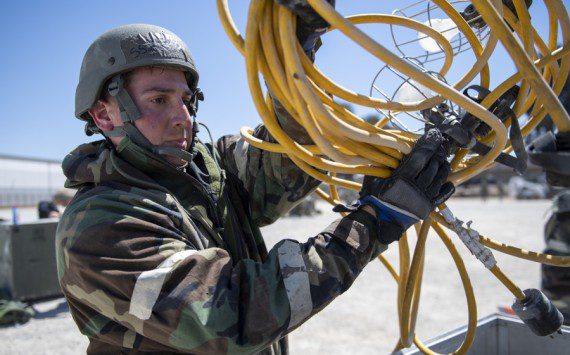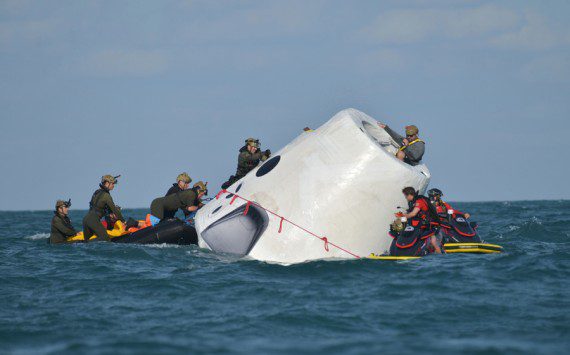Defense Secretary Ash Carter said his Force of the Future program is necessary to ensure the Defense Department continues to attract the best people America has to offer.
The secretary told students at George Washington University’s Elliot School of International Affairs Nov. 18 that one of his core commitments “is to help more of our fellow citizens make that difference in the world and in as many ways as possible.”
Carter emphasized his starting point is today’s force.
“George Washington, launched what has arguably become the most successful startup in world history: the United States military,” he said. “It secured freedom from an empire and sustained our union. It vanquished fascism, fought for freedom around the globe, won the Cold War, and went after the terrorists who attacked us on 9/11.”
But it was more than a fighting machine. American Army engineers harnessed rivers; explored the West; built canals; and eradicated disease. More recently, the military helped create the Internet and the global-positioning system.
Mastering change with excellence
“Throughout all this, the one constant has been that our military’s people have always mastered change with excellence — continuing to defend our country and help make a better world,” he said.
“But that excellence is not a birthright,” the secretary said. “It’s not guaranteed, and we can’t take it for granted in the 21st century.”
America’s advantage is tied to its people, Carter said.
“In the face of generational, technological and labor market changes, we in the Pentagon must think outside our five-sided box and try to make ourselves even better at attracting talent from new generations of Americans,” he said.
Spreading the word that DOD is hiring is part of that. Carter wants to build bridges with every sector in America from corporations to academia to families.
Learning from corporations, academia
Carter announced the idea of the Force of the Future in one of his first speeches after taking office in February. The secretary visited many corporations and learned from leaders in academia and elsewhere.
“Throughout this process, we’ve always been mindful that the military is a profession of arms,” he said. “It’s not a business. The key to doing this successfully is to leverage both tradition and change.”
DOD must be able to attract people who will be successful in the future, Carter said. He wants to build new “on-ramps” for people wishing to contribute to the department. He announced an expansion of the intern program.
”This is imperative for attracting future civilian talent,” he said. “That’s why we’re making our internship programs better managed, and also more effective at transitioning promising and successful interns into permanent employees — so that if you intern with us and do great work, we do better at connecting you with job openings.”
Many of these job openings will be published on the DOD’s LinkedIn page at www.defense.gov/LinkedIn.
Defense digital service
Carter said the department is also creating the Defense Digital Service, which will bring in talent from America’s technology community to work for a specific period of time, or for a specific project, to apply a more innovative and agile approach to solving DOD’s complex information technology problems.
“Also, to make sure we benefit from innovative entrepreneurs who aren’t technologists but have advanced skills we need, we’re going to bring in resident entrepreneurs, who will work with senior leaders on some of our most challenging projects for two years at a time,” he said.
Carter also wants to enable DoD personnel to leave for a time, learn new skills, connect with new ideas, meet innovators and then bring that back to the department.
Carter announced the doubling of the Secretary of Defense Corporate Fellowship program, and said the program will open to noncommissioned officers. The program has been in place a number of years. It allows highly qualified candidates to work in private industry for a year. Some of the companies included are Accenture, Google, SpaceX, Intel, Amazon, EMC and more. He mentioned that one alumni of the program has risen to the highest ranks of the military: Air Force Gen. Darren McDew, the commander of U.S. Transportation Command. McDew worked at Sun Microsystems.
Broadening opportunities
“I want more people to have these kinds of broadening opportunities — to be able to get off the escalator for a time, and get back on — without hurting their career, but instead helping it, which after all makes sense,” Carter said.
Another off-ramp program is the Career Intermission Program. This allows service members to take a sabbatical from their military service for a few years to get a degree, learn a new skill or start a family.
“There’s a young Navy couple that did this a few years ago,” the secretary said. “They were both aviators, flying F-18 fighter jets off aircraft carriers, but they found it difficult to reconcile their desire to start a family and go to grad school with their desire to keep serving in the fleet.
“They both considered leaving active duty and finding other ways to serve — effectively turning in their wings, which was a hard decision for each of them,” he continued. “But then they heard about this program. And they both not only used it, but their gain became our benefit. He got an MBA from Dartmouth, and after another flying tour, he’s now a top aide to the Secretary of the Navy. She got a Master’s in Public Administration from Harvard’s Kennedy School, and will soon be working in the Navy’s public affairs office. And they were able to have two children, too.”
Carter said he’ll ask Congress to make this program permanent.
The Force of the Future also includes updating and modernizing military retirement, he said.
“Right now our troops have to serve 20 years before getting any retirement benefits, but 80 percent don’t serve that long, which means they leave with no retirement benefits at all,” Carter said. “But we’ve changed that, and starting in the next few years, we’ll be able to offer a portable 401k-like plan, which all who serve can take with them whenever they move on to whatever’s next in life.”
New initiatives
Carter also announced a series of initiatives using data to make military life more attractive. The department will expand a pilot program using a LinkedIn-style application to match service members to assignments.
“We’re also going to improve our data-crunching and how we leverage big data to inform our personnel policies,” he said.
Carter said he wants the department to recruit from the broadest possible pool of talent.
“If we don’t, we risk becoming isolated and insular, and that’s not the path to success in today’s security environment,” he said. “That’s why I want everyone who’s willing and able to serve their country to have the full and equal opportunity to do so. I want everyone in this audience to view the Defense Department as a place where you could see yourselves making a contribution in the course of your careers, and also being treated with the dignity and respect you deserve.”
These are just a few of the initiatives that will be part of the Force of the Future, Carter said. He said he’ll make more announcements in the coming months. Among them are changes to the officer promotion systems and ways to improve the department manages the civilian workforce. The department is already working with the Office of Personnel Management and federal employee unions.











